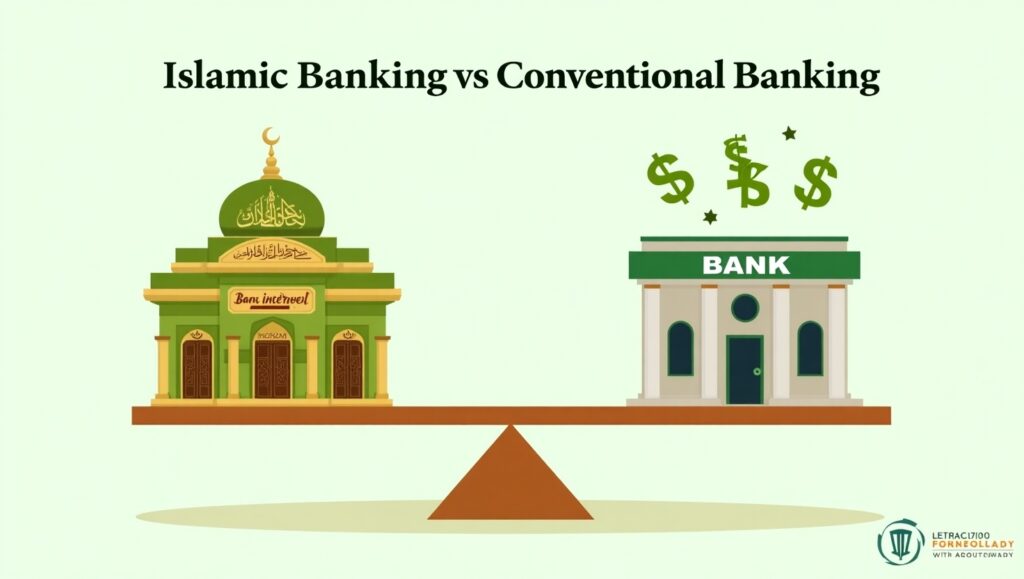Understanding the difference between Islamic banking and conventional banking is essential — especially for those who want their finances aligned with their religious beliefs or ethical values.
While both serve similar functions, they operate under different principles. Let’s break down the full comparison:
🕌 1. Core Philosophy
- Islamic Banking:
Based on Shariah law, which prohibits riba (interest), promotes risk-sharing, and requires transactions to be backed by real assets. - Conventional Banking:
Profit-driven and operates mainly through interest-based lending. It does not follow religious guidelines.
🧠 Key Difference:
Islamic banking is guided by ethical, moral, and social considerations, while conventional banking focuses purely on profit maximization.
📈 2. Interest (Riba)
- Islamic Banking:
Interest is strictly prohibited. Banks earn profits through permissible contracts like Murabaha (cost-plus), Ijarah (leasing), and Mudarabah (profit-sharing). - Conventional Banking:
Interest is the primary method of earning — customers either pay interest on loans or earn it on deposits.
🧠 Key Difference:
Islamic banks avoid interest entirely, using trade and investment instead.
🤝 Risk Sharing
- Islamic Banking:
Emphasizes profit and loss sharing. Both bank and customer share the risk and return. - Conventional Banking:
Risk is mostly borne by the borrower. Banks earn fixed interest regardless of the borrower’s success or failure.
🧠 Key Difference:
Islamic finance promotes partnership; conventional banking shifts all risk to the borrower.
🏦 Products & Services
- Islamic Banking:
Offers Shariah-compliant products like:- Murabaha (Buy-Sell Agreements)
- Ijarah (Leasing)
- Sukuk (Islamic Bonds)
- Takaful (Islamic Insurance)
- Conventional Banking:
Offers typical services like:- Interest-based loans
- Credit cards
- Fixed deposits
- Insurance with interest elements
🧠 Key Difference:
Islamic products are asset-backed and interest-free; conventional products often involve interest and speculation.
💼 Investment Approach
- Islamic Banking:
Prohibits investments in businesses considered haram (alcohol, gambling, etc.). All investments must be ethically sound. - Conventional Banking:
Invests for maximum return, regardless of the business type (as long as it’s legal).
🧠 Key Difference:
Islamic banks invest only in halal (permissible) ventures.
🧾 Contract Clarity & Transparency
- Islamic Banking:
Requires clear terms, mutual consent, and full transparency. No ambiguity (gharar) is allowed. - Conventional Banking:
While transparency is important, ambiguity and complex interest calculations are common.
🧠 Key Difference:
Islamic contracts must be 100% transparent and ethical.
🔐 Deposit & Guarantee
- Islamic Banking:
Depositors often act as investors and may share in the bank’s profits and losses. - Conventional Banking:
Deposits are treated as loans to the bank, and fixed interest is paid regardless of performance.
🧠 Key Difference:
In Islamic banking, your deposit can be part of a risk-sharing investment.
📊 Summary Table:
| Feature | Islamic Banking | Conventional Banking |
|---|---|---|
| Based on Shariah? | ✅ Yes | ❌ No |
| Uses Interest (Riba)? | ❌ No | ✅ Yes |
| Profit & Loss Sharing? | ✅ Yes | ❌ Rarely |
| Ethical Screening? | ✅ Required | ❌ Not Required |
| Transparency? | ✅ Mandatory | ⚠️ Varies |
| Products | Shariah-compliant (Murabaha, etc.) | Interest-based (Loans, Credit Cards) |
✅ Final Thoughts:
Islamic banking offers a faith-based, ethical alternative to conventional banking. It promotes fairness, risk-sharing, and real economic activity — while avoiding interest and speculation.
If your goals include aligning your money with your values, Islamic banking may be the right choice. But if you’re looking for broader flexibility and credit options, conventional banking still dominates globally.
💡 Choose the system that best fits your financial goals, values, and long-term vision.


